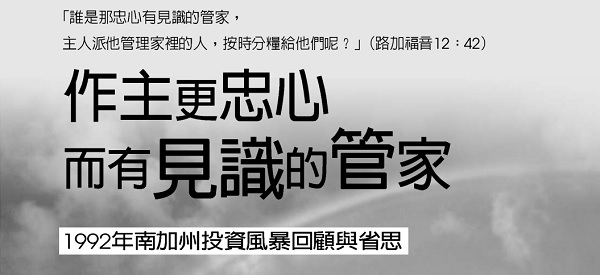Become a more faithful and knowledgeable steward of the Lord
Review and Reflection on the 1992 Southern California Investment Crisis

The storm passes
In early September 1992, in Southern California, which has a Chinese-American population of nearly one million, the sun was shining brightly and the climate was scorching hot. However, in the hearts of many people, it was as if they had experienced a cold and desolate winter covered by dark clouds. In the church and in the community, there is a lot of hurt, anger, and doubt.
The cause of the disaster was a storm caused by poor management of an investment company in Southern California (hereinafter referred to as Company T). Many churches, institutions, believers and co-workers, as well as people in the community, were all affected. The total amount involved was said to be in the tens of millions of dollars! This was a super bomb in the Chinese community in Southern California. Among them, a certain religious group whose churches, institutions, co-workers, and believers suffered the most suffered a huge blow.
According to the review report published by the sect that year, the process of the storm formation is roughly as follows:
● Company T began to enter the Chinese market. Its financial structure was fragile and its business methods were full of shortcomings. However, it relied on various documents, charts,
The information is packaged and beautified→
● The company has established a network among various groups, including recruiting Christians as cadres, and convincing them of the company’s prospects →
● These “believers” began to raise funds in the church with the mentality of “doing good deeds” →
● Fund raisers use church colleagues or organizations as “witnesses” and signs to attract customers within the church→
● The person in charge of the company secretly misappropriated funds and caused losses;
● The person in charge of the company is missing→
● Fund raisers responded to the clients they dealt with, so they took more aggressive fundraising actions, including continuing to use church colleagues or organizations as their brand names, in an attempt to reverse the decline →
● Individuals or groups continue to invest in the final stage out of ignorance or trust in the fundraiser→
● The company's turnover is not working well, and the storm is out of control...
fatal error
According to inquiries, many members and co-workers who participated in the investment started out because they saw how vast the needs of the gospel field were and how limited their own strength was. Therefore, in order to obtain more additional resources in addition to their fixed contributions. resources, so they joined the investment.
As for the affected organizations, their responsible colleagues only want to make the most effective use of the funds entrusted to them and accumulate more resources for the holy work. How do we know that Company T, which seems so safe and reliable on the surface, could be mismanaged and cause such an alarming storm?
Economist Dr. Wen Yingqian, who has organized "Christian Financial Management and Investment" courses at the "Kingdom Resources for Christ" association in the past two summers to teach "how to manage finances that belong to the Lord," looked back on this incident and said with regret that at that time, the Southern California church When investing with people in the community, they made the fatal mistake of putting all the "eggs" in one "basket", resulting in excessive concentration of risks. If something unexpected happens, all the capital will be lost. And putting the "eggs" in a "broken basket" of an informal stock listing without credibility is a more serious fatal injury!

▲Putting all the “eggs” in the same “basket” is a taboo in investment and financial management.
conservative style
In view of the fact that such storms occur every few years, most of the funds of churches or gospel organizations are currently placed in banks to earn interest in the form of fixed deposits. Such bank deposits are insured by the "Federal Deposit Insurance Corporation" (FDIC) in the United States; in Taiwan by the "Central Reinsurance Company"; in mainland China by the "China Reinsurance Group Corporation"; but other investment channels are not insured.
Dr. Wen said that in the long run, the interest rate on bank deposits is not enough to exceed the inflation rate. In other words, bank deposits are not enough to maintain their value (principal), especially in the era of low interest rates in the past ten years or so.
Most churches or evangelical institutions act very conservatively. On the one hand, they lack professional knowledge and dare not invest in risky financial instruments. On the other hand, it is better to do less than to do more. If you put it in a fixed deposit, although the profit is low, few people will complain; if you use the money donated by brothers and sisters to invest in bonds and stocks and earn high returns, not only will few people praise you, but you will also be criticized; if you lose money, things will get into trouble. Big. Putting it in a fixed deposit is better than the servant who buried the one talent in the ground as recorded in Matthew Chapter 25:25, but is it consistent with the spirit of the Lord Jesus’ approval—“a good and faithful servant?” ” From the perspective of financial management and investment, Dr. Wen suggested that it needs to be rethought and discussed.
investment principles
Dr. Wen believes that something worth considering is: If you have extra “idle” funds that are not used temporarily (usually funds for church building, missions, charity, etc. of larger churches or evangelical institutions), you can put part of it in a bank with a higher interest rate than in a bank. Low-risk investments such as Treasury bills, bonds issued by federal or state governments, or money market funds that offer higher interest rates than bank interest rates.
Securities investment is a profession. If the church has financial management talents, it can set up an "investment management committee" and initially invest 10% to 20% of the funds. Don't make the "structure" too big in the early stage, and slowly accumulate experience. The principle is to focus on capital preservation, supplemented by extra profits (higher than bank interest).
As for investing in "high-quality" company stocks, corporate bonds, or mutual funds with good performance, the risk is higher than the former, and it needs to be considered by the church's "Investment Management Committee" based on the length of the fund holding period. For example, only accounting for the total investment A small portion of the fund; this method generally only applies to long-term investments, such as accumulated retirement funds, and is not suitable for use in the church’s general fund, building fund, or missionary fund that have a useful life. Be careful to diversify your investments, diversify risks, and consult an accountant or tax advisor in advance about tax issues related to investment income from non-profit organizations.
Dr. Wen further pointed out that we are stewards of God’s money, just like managing our own money. What God wants is “goodness and faithfulness”, which means that the church’s money should be managed and used with all our heart, mind and strength, including capital preservation and investment. . The jurisprudence of U.S. courts over the years has developed three principles regarding the fiduciary duties (Fiduciary Duties) that a trustee (Trustee, Fiduciary) must comply with when entrusted to manage the money of others (beneficiaries or clients):
1. "Prudent Man Rule", that is, you should manage the money entrusted to you by others as carefully as you manage your own money;
2. "Prudent Investor Rule" , that is, we should carefully seek the maximum total return for the beneficiary;
3. "Prudent Expert Rule", that is, the trustee can seek professional consulting services.
These three laws are very consistent with the biblical principles of "goodness and faithfulness."

▲When it comes to church investment and financial management, you should consult experts.
Do nothing
However, the aforementioned financial crisis in California still has consequences. No matter how terrible the storm is, it has finally passed. In addition to examining the disaster, what is more important is how to completely repent, rebuild, and start again after the storm. At the emergency meeting after the storm broke out, all the pastoral staff of the church reflected together before God and published it in the journal published publicly by the church. On the one hand, they humbly confessed their sins, and on the other hand, they reminded all Christians to Be a more faithful and knowledgeable steward of your finances.
What is quite eye-catching in this investment storm is that one of the fund-raising specialists in Company T who is extremely powerful in attracting money is the wife of a certain church teacher! It is said that she worked in Company T purely in a private capacity and was also a victim of fraud. However, after the incident, her status as the "church's wife" still caused a lot of criticism and misunderstanding about the church.
In view of this, the co-workers of the Order reached some consensus. They believe that according to the structure of the religious order, "mothers" should be regarded as volunteers in the church. The church should not have mandatory requirements for their service, nor should it impose restrictions on their employment outside the church. However, if a teacher’s wife wants to work outside the home, she should exercise self-control and try to adhere to the following two principles:
1. Do not work in the company of church members that you pastor, to avoid embarrassment and difficulties in the pastoral work.
2. Do not engage in industries that require the use of the church’s interpersonal network, such as direct sales, certain service industries, intermediary industries, etc., to avoid unfair competition with members in the same industry, and to avoid the church being implicated when the business fails.
The pastoral staff of the church also reached a consensus: As mentioned in 1 Corinthians 6:12: “All things are lawful for me, but not all things are profitable. All things are lawful for me, but no matter what they are, I "As pastors and teachers, we need to be extra vigilant and try to avoid any commercial financial dealings with members, such as investing in partnerships, borrowing money from members, introducing others to invest, and guaranteeing money for one member to another. Members borrow money, etc., to prevent financial disputes from affecting the pastor’s image and testimony.
investment of love
Looking back on this storm, from the information and interviews we have collected, it appears that the religious group involved in the storm not only had the courage to take responsibility and openly reflect on itself, but also tried its best to treat the victims in terms of love, faith and practical actions. Provide all aspects of care so that they can be comforted and refreshed. For those co-workers who suffered losses due to their poor judgment in the past, the church authorities also trusted their original motives and goodwill, and assisted them in every possible way to repair the breach, save the crisis, and help them get through it. Rugged valley.
Just like 3,500 years ago, Moses led the Israelites out of Egypt. The people sinned against God in the wilderness and suffered discipline. However, when they all humbled themselves and repented before God, God still retained His love for them and would not let the pillar of cloud and fire leave them, but continued to be with them and lead them forward. Today, fifteen years after the financial crisis, the church is still growing and going strong, and God has indeed kept His promises.
As a co-worker of the church said at that time: "As long as we are willing to be more faithful and knowledgeable stewards of the Lord, even though investments in the world may fail, investments in love will never fail!"
 Journalist profile
Journalist profile
Liao Meihui, immigrated to the United States from Taiwan in 2001 and lives in New Jersey. When I have money, I like to travel independently; when I have inspiration, I like to interview and write stories; when I have no money and inspiration, I like to read a lot. She and her husband Wang Zhiyuan have a son and a daughter.
 Journalist profile
Journalist profile
Yang Hanjiahua, has taught in the Department of Nursing at Purdue University and Rush University in Chicago. Now I am immersed in the literature ministry, and a second spring has appeared in my life. She and her husband Yang Jingya have two adult daughters.
